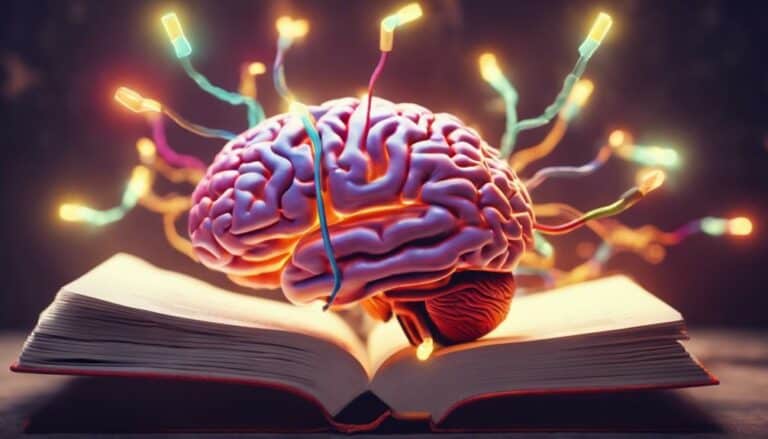Do you know that there are specific scientifically proven methods you can use to enhance your memory of what you read? Understanding these techniques can make a significant difference in how effectively you retain information from your reading sessions.
By implementing a few key strategies backed by science, you can unlock the potential to remember everything you read with ease. Want to discover these valuable memory-boosting techniques that can transform your reading experience?
Key Takeaways
- Prioritize quality sleep for memory consolidation and cognitive function.
- Engage in regular exercise to enhance hippocampal growth and memory retention.
- Utilize effective memory techniques like spaced repetition and active recall.
- Apply mnemonic devices to create strong associations and aid in memory recall.
Importance of Quality Sleep
Quality sleep plays a crucial role in memory consolidation, a process vital for storing and processing information in the brain during sleep cycles. Your brain undergoes intricate mechanisms during sleep to solidify memories and enhance cognitive functions. The National Sleep Foundation emphasizes the significance of 7-9 hours of sleep per night for optimal brain health and memory retention. When you deprive yourself of sufficient sleep, you disrupt these essential processes, leading to impaired memory formation and decreased cognitive performance.
Ensuring you get the recommended amount of sleep isn't just about feeling refreshed; it directly impacts your brain processing and overall well-being. Sleep deprivation can result in reduced focus, attention, and the ability to perform at your cognitive best. By prioritizing quality sleep, you're investing in your cognitive functions, memory consolidation, and ultimately, your optimal health. Remember, a well-rested brain is better equipped to handle the challenges of daily life and retain the information you encounter effectively.
Benefits of Regular Exercise
Regular exercise has been extensively linked to improvements in memory and brain health, notably through the promotion of hippocampal growth, a critical brain region associated with memory function. Engaging in physical activity not only enhances memory but also positively influences mood, sleep quality, and overall cognitive function. The American Academy of Neurology recognizes exercise as a beneficial strategy for individuals with mild memory issues. Aerobic exercise, in particular, can lead to an increase in the size of the hippocampus, which correlates with improved memory function. By incorporating regular exercise into your routine, you can support memory retention and contribute to a healthy brain.
| Benefits of Regular Exercise |
|---|
| – Promotes hippocampal growth |
| – Enhances memory function |
| – Improves mood and cognitive function |
Regular exercise serves as a powerful tool to boost both your physical and mental well-being. Incorporating physical activity into your daily life can lead to remarkable benefits for your memory, brain health, and overall quality of life.
Effective Information Repetition
To enhance memory retention effectively, the repetition of information plays a crucial role in strengthening neural connections within the brain. When you engage in effective information repetition, you're actively reinforcing the pathways in your brain that store that information, making it easier to recall in the future.
Here are some key points to consider:
- Spacing out repetition sessions: Distributing your repetition sessions over time can significantly enhance your long-term memory recall.
- Repeating key points: Multiple repetitions of essential information can boost comprehension and retention of the material.
- Active recall through self-testing: Testing yourself on the material or summarizing key points can solidify your memory of the information.
- Utilizing mnemonic devices: Incorporating mnemonic devices during repetition can assist in encoding information more effectively into your long-term memory recall.
Utilizing Mnemonic Devices
When incorporating mnemonic devices into your study routine, you can significantly boost your memory retention by creating strong associations between new information and existing knowledge. Mnemonic devices, such as acronyms, visualization techniques, and chunking methods, aid in remembering complex information more effectively.
Memory palaces, a widely used mnemonic strategy, involve linking details to specific locations within a familiar setting. These devices enhance memory retention by stimulating various brain regions during the encoding process, leading to improved learning efficiency.
By utilizing mnemonic techniques, you can better recall large amounts of information and grasp intricate concepts more easily. Incorporating visualization and association strategies into your learning process is key to enhancing memory and comprehending complex information efficiently.
Embracing mnemonic devices not only sharpens your memory but also makes the learning journey more engaging and fruitful.
Enhancing Relevance for Memory
Enhancing the relevance of information is vital for improving memory retention and retrieval efficiency. When it comes to reading books and trying to remember what you've read, making connections and actively engaging with the material can significantly enhance your memory.
Here are four key ways to enhance relevance for memory:
- Make Personal Connections: Relate the information to your own experiences or interests to make it more personally relevant and memorable.
- Link New Information to Existing Knowledge: Connect what you're reading to what you already know to deepen your understanding and aid in memory recall.
- Emphasize Significance: Highlight the importance of the information to increase your brain's attention and strengthen memory formation.
- Create Mental Associations: Form mental links between the new content and your personal experiences to facilitate long-term memory storage.
Conclusion
In conclusion, by implementing the scientific strategies discussed, you can easily remember everything you read.
For example, a study conducted on college students showed that those who actively engaged with the material by creating mental models and asking questions had significantly higher retention rates than those who simply skimmed the text.
By applying these evidence-based techniques to your reading habits, you can enhance your memory recall and deepen your understanding of the content.

